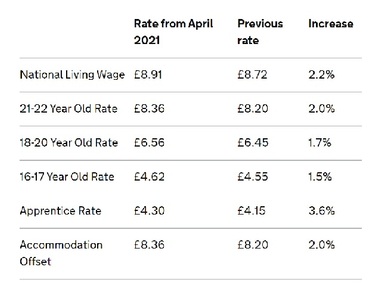Care workers more likely not to be paid minimum wage due to practices such as unclear payslips
Care workers are less likely to be paid the minimum wage because the pandemic has put businesses under more pressure with ‘various practices in social care’ such as unclear payslips contributing to underpayment.

The risk of a minimum wage underpayment is now greater since the pandemic according to a new report by the Low Pay Commission (LPC) which is calling on all bosses to comply with minimum wage rules.
The LPC has said ‘the effects of Covid-19 on the labour market will only tend to weaken the incentives for workers to report underpayment.’
Bryan Sanderson, chair of the LPC, said: “The evidence we have heard, from workers and employers alike over the past year, leaves little doubt about the strains placed on low-paying sectors by the pandemic and the increasing risk of non-compliance.
“The effects of the pandemic will outlast the lockdown period and will require a disciplined but innovative management response.”
Treatment of travel time makes it 'difficult' to prove underpayment
The LPC has discovered that even if workers are ready and willing to complain about their employer, they may face challenges in documenting their underpayment.
The law has changed in recent years to force employers to provide clear payslips, including the number of hours worked, to all workers, however the Commission warned ‘we continue to hear evidence that changes have not been put into practice as they should – above all in the social care sector’.
The LPC's new report ‘Non-compliance and enforcement of the National Minimum Wage’ stated ‘various practices in social care’ including the treatment of travel time and the time allowed for homecare appointments – make it difficult for workers to fully document their hours and prove underpayment.
‘The apparent trend is for employers to be less likely to make mistakes when they pay workers a simple hourly rate, with more potential for underpayment to creep in when they move away from this model,' the report concluded.
A survey by Unison in 2019 found that almost three quarters of home care workers did not feel they had enough information in their payslips to verify that they were paid the NMW [National Minimum Wage], and almost half of respondents did not believe they were paid for all their working time.
'Enforce' clearer payslips
The LPC is now calling for changes in legislation such as clear payslips to be ‘adequately promoted and, ultimately, enforced if they are to make a difference for underpaid workers’.
A recent Citizens Advice report (2020) revealed the pandemic has led to increasing demand for tribunals at the same time their activity is restricted by Covid. Some workers are waiting over a year for a tribunal hearing.
The Resolution Foundation has said workers most vulnerable to underpayment and other violations are less likely to make an application to a tribunal. The LPC said the impact of the pandemic and the presence of the Coronavirus Job Retention Scheme mean it is not possible to produce statistical estimates of underpayment in 2020, comparable to previous years. Workers furloughed at 80 per cent of their normal pay may appear as underpaid in the data, but do not count as such for NMW purposes.
The most recent evidence on the number of workers underpaid (published in the LPC’s 2020 non-compliance and enforcement report) found just over 440,000 workers were paid less than the NMW.
The report revealed that year on year, certain groups are more likely to be underpaid. In every year to date, women were more likely to experience underpayment than men; workers in small businesses more likely to be underpaid than those in large ones; and workers who are full-time, permanent or salaried are more likely to be underpaid than their part-time or temporary counterparts.
'Low awareness of rights'
The LPC also discovered the number of complaints received is small when compared to the numbers of underpaid workers suggesting either ‘low awareness of rights, or widespread reluctance to engage in the complaints process’.
The low volume of complaints represents ‘a serious barrier to an effective enforcement system’, the LPC concluded.
The LPC is recommending workers be made aware of the confidentiality of the complaints process and their ability to protect their anonymity and make the process accessible to all workers – including those for whom English is not a first language. The Commission is also urging the government to publish successful cases where workers have complained and been awarded arrears.

The rates of the National Living Wage (NLW) - which applies for workers aged 23 and over and the National Minimum Wage (NMW) increased on 1 April 2021, following LPC recommendations last autumn.
Different NMW rates apply to 21-22 year olds, 18-20 year olds, 16-17 year olds and apprentices aged under 19 or in the first year of an apprenticeship.
The LPC is currently seeking evidence on the impact of the minimum wage to inform its recommendations for minimum wage rates which will apply from April 2022. This includes questions about the enforcement regime.
The Low Pay Commission consultation 2021 is open until 18 June 2021 and can be found here.
Latest News
 29-Jul-24
Dementia Bus gives carehome.co.uk staff insight into life with dementia
29-Jul-24
Dementia Bus gives carehome.co.uk staff insight into life with dementia
 27-Jul-23
UK's top home care agencies in 2023 revealed
27-Jul-23
UK's top home care agencies in 2023 revealed
 30-Nov-22
A quarter of older people keep their falls secret from family
30-Nov-22
A quarter of older people keep their falls secret from family
 29-Nov-22
'Covid-19 has not gone away' say terminally ill
29-Nov-22
'Covid-19 has not gone away' say terminally ill
 28-Nov-22
IT consultant who received poor care opens 'compassionate' home care business
28-Nov-22
IT consultant who received poor care opens 'compassionate' home care business